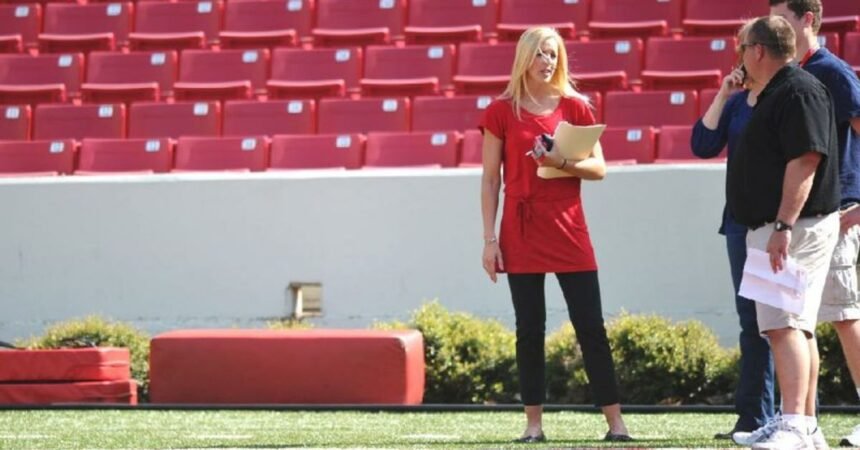Introduction
Jessica Dorrell became a focal point of national attention in 2012 due to her involvement in a high-profile controversy surrounding former Arkansas Razorbacks head football coach Bobby Petrino. The incident, which involved both a professional relationship and a personal affair, led to widespread media coverage and public scrutiny. Dorrell’s name is still often associated with this controversy, and the events that unfolded have sparked important discussions about ethics, leadership, and workplace conduct in sports organizations.
This article aims to provide a comprehensive exploration of the Jessica Dorrell controversy, focusing on key concepts, the significance of the events, and the broader implications for sports leadership and professional ethics. We’ll also address the challenges faced by public figures involved in such incidents and offer potential solutions to prevent similar situations in the future.
Understanding the Jessica Dorrell Controversy
1. Background: Who is Jessica Dorrell?
Jessica Dorrell was a former volleyball player and athletic department employee at the University of Arkansas. In 2012, she worked as the student-athlete development coordinator for the Arkansas Razorbacks football team. Her role involved interacting with players, helping manage various team logistics, and supporting student-athletes in their academic and personal development.
However, her professional achievements became overshadowed by her personal involvement with Bobby Petrino, the football team’s head coach at the time. Petrino’s hiring of Dorrell, along with their undisclosed romantic relationship, quickly became the subject of national headlines.
2. The Incident: What Happened in 2012?
The controversy surrounding Jessica Dorrell unfolded after an April 1, 2012, motorcycle accident involving Bobby Petrino. Initially, Petrino claimed he was alone during the accident. However, it was soon revealed that Dorrell was riding with him, and they were involved in an extramarital affair.
This revelation brought to light a series of ethical concerns, as Petrino had been instrumental in Dorrell’s hiring for a high-ranking position within the football program just days before the accident. Petrino failed to disclose the personal nature of his relationship with Dorrell during the hiring process, raising questions about conflict of interest and professional misconduct.
3. Ethical Implications of the Scandal
The Dorrell-Petrino scandal brought forward significant ethical issues, especially in the context of workplace relationships. Petrino’s failure to disclose his personal involvement with Dorrell before her hiring raised concerns about favoritism and the violation of university hiring protocols. This incident highlighted the importance of transparency, fairness, and professional boundaries in leadership roles, especially in high-profile institutions like college sports programs.
The situation also sparked discussions about the responsibilities of athletic departments to enforce strict policies that prevent such conflicts of interest from undermining the integrity of their operations.

The Importance and Benefits of Ethical Leadership in Sports
4. Leadership in College Athletics: Why Ethics Matter
Ethical leadership is a critical element in sports, particularly in college athletics, where coaches and administrators serve as role models for young athletes. The behavior of leaders within a sports organization sets the tone for the entire program. In the case of Bobby Petrino and Jessica Dorrell, the scandal demonstrated how a failure to adhere to ethical standards can result in significant damage to the reputations of individuals and institutions alike.
For coaches, transparency and honesty are non-negotiable values. Leaders who maintain ethical standards are better equipped to foster an environment of trust, respect, and accountability—qualities essential for the success of any sports program.
5. Protecting Institutional Integrity
One of the primary benefits of upholding ethical standards in sports organizations is the protection of institutional integrity. The University of Arkansas, like many other universities with high-profile athletic programs, is deeply invested in its public image. Scandals such as the Dorrell-Petrino incident can tarnish the reputation of the entire institution, causing long-term damage.
By establishing clear codes of conduct and holding employees accountable to these standards, institutions can maintain their credibility and prevent situations that may lead to legal and reputational consequences.
6. Promoting Fair Hiring Practices
Another important aspect of the controversy revolves around the hiring practices within the Arkansas Razorbacks program. Petrino’s decision to hire Dorrell without fully disclosing their personal relationship raised questions about the integrity of the hiring process. In sports organizations, it is essential to promote fair and transparent hiring practices to avoid accusations of favoritism or bias.
This case underscores the importance of conducting thorough, impartial hiring processes that evaluate candidates based on their qualifications, experience, and merit. Such practices not only ensure fairness but also reinforce public confidence in the organization’s operations.
Applications and Use Cases of Ethical Leadership
7. Building Trust with Players and Staff
One of the most valuable lessons from the Jessica Dorrell scandal is the importance of trust in leadership. Coaches and administrators who lead with integrity are more likely to gain the trust of their players, staff, and peers. In college athletics, trust is essential for fostering team cohesion, mutual respect, and effective communication.
In contrast, when trust is broken—whether through ethical breaches or poor decision-making—the entire team dynamic can suffer. The Dorrell-Petrino incident serves as a reminder of the potential fallout when leaders fail to uphold ethical standards.
8. Creating a Culture of Accountability
Accountability is a cornerstone of effective leadership. For coaches and sports administrators, holding themselves and others accountable for their actions creates a culture of responsibility and professionalism. In the case of Petrino and Dorrell, the lack of accountability contributed to the scandal’s escalation, ultimately leading to Petrino’s dismissal from the University of Arkansas.
Organizations that prioritize accountability are better equipped to handle conflicts and challenges that may arise. This culture of responsibility encourages employees to act in the best interests of the team and the institution, reducing the likelihood of ethical violations.
9. Navigating Personal Relationships in the Workplace
While workplace relationships can sometimes be inevitable, they should be handled with transparency and professionalism to avoid conflicts of interest. The Jessica Dorrell scandal serves as a case study in how personal relationships can disrupt workplace dynamics if not managed properly.
Sports organizations, like other institutions, should implement clear policies regarding workplace relationships to ensure that personal connections do not interfere with professional responsibilities. By establishing boundaries and encouraging open communication, organizations can minimize the risks associated with personal relationships in the workplace.
Challenges and Solutions in the Aftermath of the Scandal
10. Addressing Public Backlash
Following the revelation of the Dorrell-Petrino affair, both individuals faced intense public scrutiny. For Dorrell, the controversy not only affected her professional career but also brought unwanted attention to her personal life. This kind of media frenzy can have lasting effects on a person’s reputation and future opportunities.
For public figures involved in such scandals, one of the main challenges is managing the fallout and attempting to rebuild their careers. Transparency, honesty, and taking responsibility for one’s actions are essential steps toward regaining public trust.
11. Rebuilding Careers After a Scandal
Rebuilding a career after a high-profile scandal like the Jessica Dorrell case can be a difficult and lengthy process. Both Dorrell and Petrino had to face the consequences of their actions—Petrino lost his job as head coach, and Dorrell’s role within the university came to an end.
For professionals in similar situations, the path to recovery often involves demonstrating personal growth, taking accountability, and working to rebuild their professional reputations. Moving forward requires individuals to focus on repairing relationships, improving their skills, and showing a commitment to ethical behavior.
12. Implementing Stronger Ethical Guidelines in Sports Programs
The University of Arkansas, like many other institutions, recognized the need for stronger ethical guidelines in the aftermath of the scandal. By implementing stricter policies and holding leaders to higher standards, sports programs can prevent future incidents like the Dorrell-Petrino controversy.
These policies should include clear protocols for managing workplace relationships, ensuring transparency in hiring processes, and holding all employees accountable to the same ethical standards. Establishing these guidelines helps create a culture where ethical breaches are less likely to occur.
13. Preventing Conflicts of Interest
One of the key lessons from the Dorrell scandal is the importance of preventing conflicts of interest in the workplace. In this case, Petrino’s failure to disclose his personal relationship with Dorrell before hiring her led to accusations of favoritism and ethical misconduct.
Organizations can prevent such conflicts by establishing clear rules regarding employee relationships and ensuring that hiring processes are transparent and merit-based. In situations where personal relationships do exist, full disclosure and transparency are essential to avoid any perception of impropriety.
Conclusion
The Jessica Dorrell and Bobby Petrino controversy was a defining moment for both individuals and the University of Arkansas. It highlighted the importance of ethical leadership, transparency, and accountability in college athletics and served as a case study in the potential consequences of ethical breaches.
This incident serves as a reminder for sports organizations to establish clear ethical guidelines, promote fair hiring practices, and foster a culture of trust and accountability. By learning from the Dorrell scandal, sports programs can prevent similar situations in the future and maintain their integrity.
FAQs
1. What was the Jessica Dorrell controversy about?
The controversy involved an undisclosed affair between Jessica Dorrell and Arkansas Razorbacks head coach Bobby Petrino, leading to ethical concerns and Petrino’s eventual dismissal.
2. Why did the scandal lead to Bobby Petrino’s firing?
Petrino was fired for failing to disclose his personal relationship with Dorrell during the hiring process, which violated university policies and raised ethical concerns.
3. What lessons can be learned from the Jessica Dorrell scandal?
The key lessons include the importance of ethical leadership, transparency in hiring, and preventing conflicts of interest in the workplace.
4. How can organizations prevent similar scandals in the future?
Organizations should establish clear ethical guidelines, enforce workplace relationship policies, and promote transparency and accountability among their leaders.
5. What impact did the scandal have on Jessica Dorrell’s career?
The scandal negatively affected Dorrell’s professional career, leading to her resignation from the University of Arkansas amid widespread media scrutiny.




